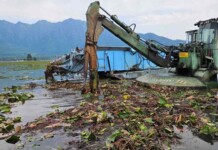
After decades of overfishing in the northwest Atlantic Ocean, hake fisheries off the coast of Spain are as large as ever thanks to timely and targeted conservation measures.
It’s believed that these same methods could be used in other saltwater species of economic value and have the potential to increase sustainable catch quotas of existing managed fish.
Mild, flakey, and delicious—perfect for a fry-up—hake is a huge part of Galicia’s economy and gastronomy.
But in 1980, indiscriminate fishing practices were causing catch numbers to plummet, threatening the species, the marine food web, fishermen’s livelihoods, and the cuisine of the region.
Marine conservationists stepped in, and now the stocks are stronger than ever.
Measures such as creating secure breeding areas, enforcing tight catch limits based on scientific evidence, and enlarging fishing net mesh so that juvenile hake can escape to breed, all contributed to this recovery.
Traceable, selective fishing gear also played a role, and the fishermen who cooperated are now being rewarded.
“Reaching this level of recovery and currently having an abundance of northern hake in the Atlantic isn’t an accident,” said Marine scientist Javier López from the conservation org Oceania.
YOU’LL ALSO LIKE: Shrimpers and Crabbers Get Paid to Collect Abandoned Traps, Saving Wildlife from Derelict Fishing Hazards
“It’s the result of careful management, control measures, and favorable ocean conditions. But credit must also go to the fishing sector which has endured these measures,” López told Euro News.
Meanwhile, in the Mediterranean, hake has been slower to recover. In contrast to the Atlantic, the Med is still by and large being overfished. Some Italians believe that it’s overfishing that turned the cuisine and culture of the island of Sardinia into one that focuses quite intensely on meat and dairy products.
MORE SUSTAINABLE STOCKS: True ‘River Monster’ of the Amazon Has Recovered Thanks to New Sustainable Fishing
Hake measures have been implemented more slowly, and though they are increasing, they are still at levels that could suffer sudden declines.
“The sea is generous; with the right measures in place, resources could be replenished. There are limits we must not cross, but if we act wisely, we can be confident that the fish will return,” concluded López.
SHARE This Great News For Sustainable Seas With Your Friends…




















